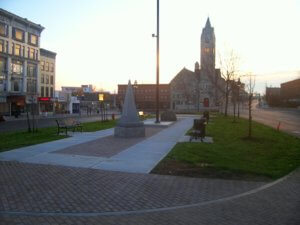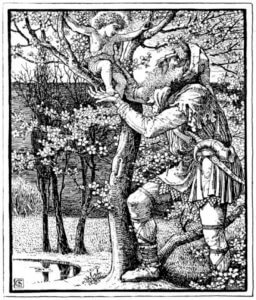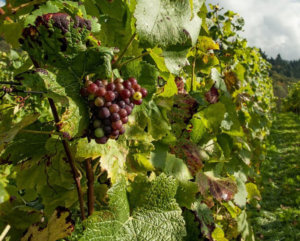
Homily: 18th Sunday after Pentecost (Year A) – Proper 22
Come, thou long expected Jesus,
Born to set thy people free;
From our fears and sins release us,
Let us find our rest in thee[1]
 Last week I traveled to Watertown, NY. Close by the shore of Lake Ontario, Watertown is the hometown of my recently departed wife. Perhaps a little known fact, Watertown is also the hometown of Della+, our Rector. My family and I were committed to this journey as we accompanied my wife on the final steps along her path towards the Risen Christ. It was a glorious Saturday as we laid Josephine to rest. Here we placed her alongside her mother, father, brother, all of generations that had gone before. Here, resting on the brow of the lake she had visited so often in life, she came to rest in the place closest to her heart.
Last week I traveled to Watertown, NY. Close by the shore of Lake Ontario, Watertown is the hometown of my recently departed wife. Perhaps a little known fact, Watertown is also the hometown of Della+, our Rector. My family and I were committed to this journey as we accompanied my wife on the final steps along her path towards the Risen Christ. It was a glorious Saturday as we laid Josephine to rest. Here we placed her alongside her mother, father, brother, all of generations that had gone before. Here, resting on the brow of the lake she had visited so often in life, she came to rest in the place closest to her heart.
God’s creation smiled upon us. We were embraced by the warmth of the sun, clouds passing softly overhead, under the broad canopy of ancient trees and the soft caress of a gentle breeze. The power of the Holy Spirit was among us. All of the confusion, fear and anxiety from our upside down world was left behind as we entered this beautiful space . We were enveloped in God’s creation, God’s garden, in God’s vineyard.
The Selfish Giant
One of my Josephine’s favorite stories is The Selfish Giant.[2] You remember Oscar Wilde’s story. It is a powerful reminder that God always present with to God’s people and revealed at the moment of our greatest need. Here we are today, confused, fearful, struggling to find the truth while besieged by conflicting messages. We have slipped our moorings and tossed about on a troubled sea. We reach back, searching for that anchor of values and faith that has steadied us in life. We seek the Cross that is our Anchor. We seek the presence of God in our lives. We seek reconciliation with our God today more powerfully than any other time in memory. Walk with me now as we find the hope of God’s enduring presence revealed in the stories of the Selfish Giant and Matthew’s vineyard.
Like the Landlord in Matthew’s vineyard this morning, the Selfish Giant has a beautiful garden filled with fruit trees, flowers and the song of birds. The Giant returns from a long trip to discover that the children, drawn to its beauty, have been playing in his garden. The Giant becomes angry. “This is my garden!,” he cries. He drives the children away and surrounds the garden with a high stone wall. Denied the garden, the children wander about outside the garden seeking happiness in the rocky, dusty street.
Spring arrives. Yet the garden remains locked in winter. It lies under a cover of snow. The winter wind howls. The trees fail to yield fruit. The flowers refuse to blossom. The songbirds are absent. Some weeks later, the Giant arises from his bed to the sound of lovely music. He gazes from his window and is amazed to see that Spring has returned. The trees are in blossom, the songs of birds fill the air. The children have crept in through a hole in the wall and are sitting in the trees. In their unwillingness to be denied by the Giant’s selfishness, they have brought Spring to the garden.
 In the far corner of the garden, a single bare tree remains covered in frost. Beneath the tree a very small boy is crying. He is too small to climb up in his tree. Moved by pity, the Giant goes to the boy and raises him gently to a branch. The tree instantly breaks out in blossoms. The boy kisses the Giant. “What have I done?,” the Giant says! “How selfish have I been!” He tears down his wall and declares the garden open to the children, who return, no longer fearful.
In the far corner of the garden, a single bare tree remains covered in frost. Beneath the tree a very small boy is crying. He is too small to climb up in his tree. Moved by pity, the Giant goes to the boy and raises him gently to a branch. The tree instantly breaks out in blossoms. The boy kisses the Giant. “What have I done?,” the Giant says! “How selfish have I been!” He tears down his wall and declares the garden open to the children, who return, no longer fearful.
The years pass. The Giant is devoted to the children, yet longs for the small boy, who does not return. One wintry day the now elderly Giant looks out upon his garden, still locked in frost. He is amazed to see a single tree in the farthest corner ordained with white blossoms, bearing silver fruit on golden branches. Beneath the tree he spies the small boy who has returned, at last. On the Child’s hands and feet the Giant spies the prints of nails. “Who art thou?, who hast dared to wound thee?” the Giant asks, as he falls to his knees before the child. The boy responds: “Don’t be angry, for these are the marks of love. One day, you let me play in your garden. Today you shall come with me, to my garden, in Paradise.”
As the children return to the garden, they discover the Giant’s body lying beneath the tree, covered in white blossoms.
The Vineyard
This morning, during the final week of his life, Jesus tells a story of another garden, a vineyard.[3] This is the second of three parables he tells in sequence, all of which critique the failure of the religious leadership of Jerusalem to respond to God’s call.[4] As with the Selfish Giant, Jesus calls for a change of management. He is not calling for replacement but for resurrection.[5] His audience, the leadership of the chief priests and the Pharisees are intimately aware of Isaiah’s words spoken to us this morning. Isaiah prophesies that the vineyard of the Lord of hosts is the house of Israel. God had intended a harvest of sweet grapes. However under their management the house of Israel has yielded wild grapes. The leadership are left in no doubt that Jesus is speaking directly to them.
 A landowner plants a vineyard. He builds a fence and watchtower to protect it. He entrusts the vineyard to tenant management, then departs for four years to await the first fruit. A vineyard is an investment for the future, not for immediate financial return. It is a risky venture, as it depends on new vines, planted on untried soil. The vineyard is left in the care of unknown tenants who expect payment for their labor. This is an investment to benefit generations yet to come.
A landowner plants a vineyard. He builds a fence and watchtower to protect it. He entrusts the vineyard to tenant management, then departs for four years to await the first fruit. A vineyard is an investment for the future, not for immediate financial return. It is a risky venture, as it depends on new vines, planted on untried soil. The vineyard is left in the care of unknown tenants who expect payment for their labor. This is an investment to benefit generations yet to come.
Four years later the fruit is ready. The landowner dispatches his representatives to negotiate the final reckoning. The tenants have no interest in fulfilling their end of the bargain. They refuse to return the vineyard to its owner. The landlord’s emissaries are beaten, stoned and murdered. In their ultimate disrespect for the landowner, the tenants throw the son out of the vineyard and kill him. Fast forward to the crucifixion of Jesus on that bare hill outside the city of Jerusalem. The audience gets the message. The religious leaders understand they are the unworthy tenants. Believing they are the ones to have brought the vines productive, they claim ownership of the vineyard.[6]
Jesus asks what sentence they would pass on these unworthy tenants. The chief priests and the Pharisees pass judgment on themselves. They demand retribution and call for dismissal of the wretched tenants. They counsel the landlord to install responsible tenants who will distribute its harvest.
Resurrection
As in the Giant’s garden, the vineyard is a symbol of resurrection. The Giant is reconciled to his true nature and enters the Kingdom of God. It was never the Giant’s garden, nor does the vineyard belong to the unworthy tenants. The son thrown from the vineyard becomes the stone rejected by the builders of the wall. As God resumes possession of the vineyard, the son, the rejected stone, is resurrected as the cornerstone, or keystone of God’s kingdom.
How hard it is to hold fast to our faith through the pain, confusion and loss we have experienced in these dark months, which shows no sign of abating. We long for the companionship of friends and loved ones, denied to us by the threat of this invisible killer virus. We are distressed by the loss of our children’s pre-school at Emmanuel. We long to return to the full practice of our faith. We seek answers from our political and religious leaders. We find no clarity, no comfort, only confusion, disagreement and anger.
In the days leading up to my time with you today, I received a call from a dear friend. She is deeply faithful, her life is filled with prayer and service to others. She works in television journalism where, day and night, she is tossed by the cross-current of conflicting personal and spiritual values. She yearns for that anchor, the confidence in the Cross, to steady her course within the incessant drumbeat from her newsday world. Like the children forced outside the garden, each of us must pursue our faith on that dusty, rocky road. We seek, and will find, that small opening in the wall that leads to into the glorious landscape of God’s presence. I pray that our journey at Emmanuel, today and in the many days ahead, enriches our confidence in the ever-present redemption of God as we go forth from this sacred place.
The truth of it is that our hope, our anchor is grounded in the rock-solid foundation of Christ.
Take comfort in these words of Isaiah: (65:17-18)
For I am about to create new heavens
and a new earth;
the former things shall not be remembered
or come to mind.
But be glad and rejoice forever
in what I am creating;
for I am about to create Jerusalem as a joy,
and its people as a delight
Works Referenced:
This is a homily delivered to a congregation at Emmanuel Church, Newport RI on Sunday, October 4,2020. I am indebted to the following for their insights into the lectionary for the day: R.T. France, The Gospel of Matthew, Eerdmans, 2007; Simon J. Kistermaker, The Parables, Understanding the Stories Jesus Told, Baker books, 1980, and Donald Senior, Matthew, Abington Press, 1988
Roger C. Bullard, October 4, 2020
[1] Hymn 66, The Hymnal, 1982, Charles Wesley (1707-1788)
[2] Oscar Wilde, The Selfish Giant, May 1888
[3] Simon J. Kistemaker, The Parables, Baker Books,1980 p.83
[4] R.T. France, The Gospel of Matthew, Eerdmans, 2007 p.800
[5] Ibid, p.801
[6] op.cit, Kistemaker p.85
